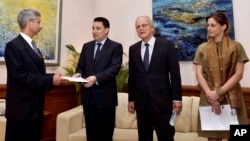India on Monday joined an exclusive club of countries controlling exports in missile technology, just a day after bemoaning its exclusion from another elite group that governs international nuclear fuel and technology.
Foreign Secretary S. Jaishankar signed onto the Missile Technology Control Regime aimed at preventing the unchecked proliferation of missiles and their delivery systems.
The Foreign Ministry, in a statement issued soon after signing the accession document in the presence of the ambassadors of France, the Netherlands and Luxembourg, thanked the other 34 members of the MTCR group for supporting its inclusion.
“India's entry into the regime as its thirty-fifth member would be mutually beneficial in the furtherance of international non-proliferation objectives,” the statement said.
Admission in the MTCR was seen as the next step for India in legitimizing its nuclear energy and missile programs after it conducted atomic tests in 1998 that alarmed the international community.
The MTCR restricts the proliferation of missiles, rocket systems, unmanned air vehicles, or drones, and the technology for systems capable of carrying a payload of 500 kilograms (1,100 pounds) for at least 300 kilometers (185 miles), as well as systems intended for the delivery of weapons of mass destruction.
In 2008, India signed a landmark civil nuclear deal with the United States giving it some access to nuclear materials and technologies.
Since then, India has been pushing for its inclusion in the various elite groups that control the export of nuclear materials and regulate technologies relating to conventional, nuclear, biological and chemical weapons.
India still hopes to secure support for joining the Nuclear Suppliers Group, despite strong objections from China.
Last week, at a plenary meeting of the nuclear group in Seoul, India's membership to the 48-nation group that controls access to sensitive nuclear technology was shot down after China raised procedural hurdles.
India, still smarting over being denied entry, on Sunday hit out at Beijing, saying that the issue of its membership of the nuclear group was not going to go away.
External Affairs ministry spokesman Vikas Swarup said New Delhi had taken up the issue with Beijing at multiple levels.
“We are going to continue discussing this with China. This is going to be an important element of our discussion with China. We will continue to impress upon them that relationships move forward on the basis of mutual accommodation of each other's interests, concerns and priorities,” Swarup told reporters in New Delhi.
China is not a member of the MTCR, however. Beijing's application to join the MTCR is pending, leading to some analysts in New Delhi to say India could use it as a bargaining chip to leverage its entry into the nuclear group.




